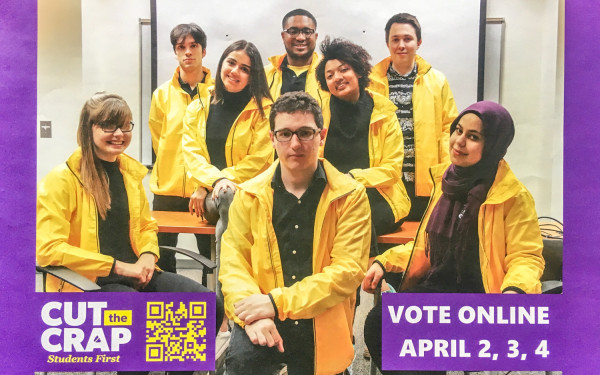Editorial: Why We’re Endorsing RiZe
Last Year Our Endorsement Was Contested, But Endorsements Are a General Practice
It’s that time of year again: spring, finals, and the Concordia Student Union elections are right around the corner.
This year, three slates are running: RiZe, Cut the Crap, New Community, and one independent candidate, Jane Lefevbre-Prevost for Academic & Advocacy Coordinator. Three teams of students with a vision for our university and a plan to enact it.
Our editorial team were concerned about publishing an endorsement after last year’s was met with anger and confusion. The chief-electoral officer even declared it to be illegal, over the suspicion of collusion, and disqualified the slate we’d endorsed, Speak Up.
The decision was eventually overturned.
We stand by our right as a publication to make endorsements when our team reaches a consensus. They are common practice in journalism, and The Link’s been doing so since the 80’s.
We believe that one slate stands out among the others as the most fit to run the CSU: RiZe. We believe their platform touches one the most important issues students face.
This year we’ve seen students mobilize against unpaid internships and continue to contest the school’s inadequate response to sexual violence on campus.
The deregulation of international students’ tuition has highlighted the need for more support for international students, as new students in three John Molson School of Business programs are set to see tuition hikes, raising over the next three years.
The current CSU has been expanding services for mental health and addiction support to counter long wait times and inaccessibility within Concordia’s Health Services and Counselling and Psychological Services.
RiZe’s platform covers all these bases.
RiZe doesn’t only support labour rights in the fight against unpaid internships. Academic and advocacy coordinator Harvin Hilaire wants to aid students searching for jobs through providing a list of employers providing poor working conditions, require more work from May and August, and to help students that do not speak french seek employment.
RiZe’s candidate for general coordinator Margot Berner wants to ensure sexual violence policies at the university are accessible and sensitive to the needs of survivors, as she formerly helped ASFA update their sexual violence and racial discrimination policy.
Given the recent handling on cases surrounding sexual misconduct, students still feel betrayed by Concordia’s administration. Having student representative’s vocal about their discontent with the administration, and who will look to hold them to account, is encouraging. But we realize these promises are easier said than done, and we hope to see them follow through.
Of course, we have to admit that New Community’s platform has good points that reflect the real needs of Concordia students as well. They also present inventive ideas for increasing the richness of student life, like creating a greenhouse at Loyola campus.
But we can’t ignore the heavy involvement of some of the candidates in SEIZE, a solidarity economy incubator that was struck down twice by the CSU earlier this year, mainly because they advocated for reducing one of the CSU’s fee-levies.
New Community’s move to campaign with SEIZE as a main point in their platform, despite the reality that it is a project with little effect on the student body as a whole, leaves us concerned about their viability as the union’s executives.
Though New Community seems too focused on SEIZE, we believe they’re a better choice than Cut the Crap.
Cut the Crap refused interviews with The Link, in contrast to the two other slates. As journalists, we take access to information and holding those that represent the undergraduate population seriously. It is vital for politicians to be open with the community and allow journalists to report on them.
Cut the Crap has been highlighted the issue of the dirty Hall building bathrooms, while not being vocal about some of their other platform ideas such as introducing an online opt-outs, which if enacted, could cause serious harm to the functioning of many student groups on campus.
The proposed policy is also reminiscent of Doug Ford’s opt-out of non-mandatory fees—a reform that could have threaten ramifications on student press in Ontario.
Student papers fear this could decrease accountability towards student and university governance, as their funding depends on student fees.
Online opt-outs will not only affect the livelihood of student media, but other student services and groups as well. At Concordia, opt-outs will harm fee-levy groups like the Concordia Community Solidarity Cooperative Bookstore, CJLO, People’s Potato, The Hive Café, Canadian Refugee Initiative, among many others.
We also have questions over the eligibility of their candidate for general coordinator, Chris Kalafatidis. In February, the legitimacy of the Political Science Student Association’s general assembly was a question of concern for many students. The CSU’s general coordinator, Sophie Hough-Martin, even made it clear at the assembly that the PSSA not only made the venue inaccessible to all of its members since it was at bar where minors couldn’t attend, but also broke also provincial law.
Their president at the time even acknowledged it’s illegitimacy telling The Link, “It should’ve been advertised way in advance and it’s possible people under 18 were discouraged from attending. In that sense potentially it could be recognized as illegitimate.”
But being the “largest amount of students” to the attend a GA was good enough to put the association at risk of losing its accreditation.
Another issue with their platform is that it does not make any mentions of the sexual violence issues plaguing Concordia and doesn’t offer any ways to fix them, once again in contrast to the other two slate’s platforms.
We encourage undergraduate students to vote and to consider who may be a best fit run our student union, especially in light of issues such as unpaid internships and addressing sexual violence on our campus.





_600_375_90_s_c1.jpg)
